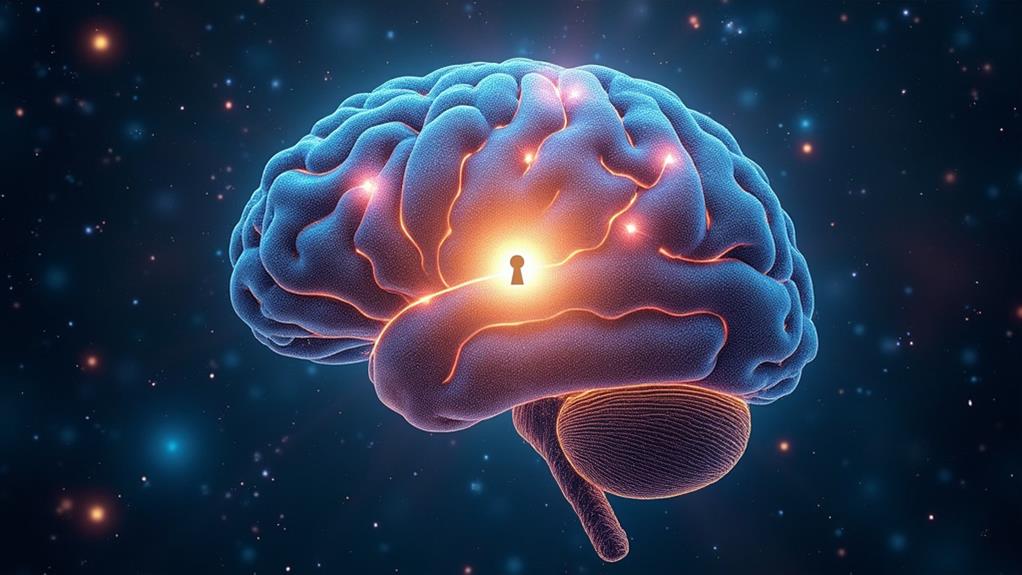
You hold the key to your mind’s vast potential, and accessing it often involves stepping beyond traditional learning methods. Techniques like hypnosis and effective visualization don’t just modify superficial behaviors but give you the key to your mind to facilitate deep, transformative insights into your own subconscious. Hypnosis, for instance, isn’t about being controlled; it’s a voluntary state where you intensely focus and relax, allowing you to uncover and heal underlying issues.
Similarly, crafting vivid mental images sharpens your focus and enhances emotional connections, aligning your deepest intentions with your everyday actions. As you cultivate these skills, you’ll find your mental clarity and emotional resilience improving, hinting at even deeper changes on the horizon.
Key Takeaways
- Engage in regular mindfulness and meditation to enhance mental clarity and focus.
- Practice self-hypnosis to access and influence the subconscious mind.
- Utilize visualization techniques to strengthen emotional connections and goal achievement.
- Cultivate emotional awareness and balance through mindfulness to improve overall well-being.
- Challenge cognitive abilities with brain training, mnemonic devices, and problem-solving activities.
Understanding Hypnosis
You might’ve heard that hypnosis can manipulate your mind or that it’s merely stage trickery, but these myths couldn’t be more misleading.
In reality, hypnosis offers profound benefits for mental and physical health, allowing you to access and influence the subconscious mind in a controlled, therapeutic setting.
Hypnosis Myths Debunked
Despite popular belief, no one can use hypnosis to control your mind against your will. It’s essential to start by debunking myths and dispelling misconceptions about this profound practice. Hypnosis isn’t about being helpless or manipulated; it’s a voluntary state of focused attention and increased suggestibility with therapeutic potentials.
Exploring techniques of hypnosis reveals that it involves guided relaxation and intense concentration, often leading to better insights into your own mind.
Understanding benefits, though not delving deep into specifics here, is about recognizing hypnosis as a gateway to better self-management and emotional clarity.
Practicing self-hypnosis is particularly empowering. It allows you to tap into your subconscious mind, facilitating changes in perceptions, sensations, and behaviors.
Benefits of Hypnosis
Building on a clearer understanding of what hypnosis isn’t, let’s explore its numerous benefits, particularly in enhancing mental health and overall well-being. You might find it fascinating how this tool can greatly improve various aspects of your life through mental recalibration and emotional healing.
Here are five compelling benefits of hypnosis:
- Healing Trauma: Hypnosis provides a safe space for you to access and process past traumas. It helps detach the power of traumatic memories, allowing you to heal and move forward.
- Boosting Confidence: By reinforcing positive beliefs and diminishing self-doubt, hypnosis can significantly elevate your self-esteem and confidence levels.
- Overcoming Fears: Whether it’s a fear of flying or public speaking, hypnosis works by reprogramming your subconscious responses to fear, empowering you to live more freely.
- Enhancing Focus: Hypnosis can train your brain to enhance concentration and ignore distractions, making you more efficient at work and in daily activities.
- Improving Sleep: Through relaxation techniques and mind-calming exercises, hypnosis effectively combats insomnia and improves overall sleep quality.
Embrace hypnosis as a pathway to a healthier, more controlled mind, where you’re not just surviving but thriving.
The Power of the Subconscious

You’ve likely noticed how your emotions can surge and ebb, affecting your day-to-day life; this is your subconscious at work, harnessing emotional strength without your conscious effort.
Imagine leveraging this power deliberately to achieve your goals, where the act of visualizing success can actually steer your path towards it.
Harnessing Emotional Strength
How often do we overlook the impact of emotions on our physical health and life choices? You mightn’t realize it, but your emotional strength plays a crucial role in your overall well-being. Harnessing this strength is about more than just feeling good; it’s about developing emotional resilience, fostering inner strength, and maintaining emotional balance that ultimately contributes to your mental wellness.
The mind-body connection is profound. When you’re emotionally balanced, your body responds with energy and health. Here’s how you can enhance your emotional strength:
- Cultivate Awareness: Recognize and label your emotions as they arise.
- Practice Mindfulness: Stay present to temper emotional extremes.
- Build Resilience: Develop strategies to cope with stress and adversity.
- Seek Balance: Aim for emotional equilibrium to maintain clarity and focus.
- Prioritize Wellness: Engage in activities that promote mental and physical health.
Imaginative Goal Creation
As we explore the world of “Imaginative Goal Creation,” it’s important to acknowledge the immense power your subconscious holds in shaping your reality. Through creative visualization and effective goal setting, you can harness this mind power to manifest your deepest desires. It’s not just about wishing; it’s about using imagery techniques to vividly imagine achieving your goals, thereby programming your subconscious to work towards turning these visions into reality.
You’re not passively dreaming but actively constructing your future. Imagine using positive thinking to fuel your journey; each positive thought is a step closer to your success.
Benefits of Self-Hypnosis

Self-hypnosis can greatly boost your mental health, allowing you to manage stress and anxiety more effectively. It also plays an important role in enhancing physical well-being by promoting better sleep patterns and aiding in pain management. By regularly practicing self-hypnosis, you’re not just improving your current state, but also investing in a healthier, more resilient future.
Enhancing Mental Health
Enhancing your mental health can be greatly improved through the practice of self-hypnosis. This powerful tool taps into the subconscious, fostering a harmonious mind-body connection that’s essential for overall health. By engaging in self-hypnosis, you’re not just performing a routine; you’re starting on a journey of emotional healing, which can alleviate psychological burdens and improve your life quality.
Self-hypnosis aids in cognitive enhancement, allowing your brain to clear out mental fog and sharpen its focus. This leads to improved mental clarity, making daily tasks and decision-making processes more manageable. Additionally, the psychological well-being that emerges from regular practice is profound. It not only soothes but also strengthens your mental landscape against future stresses.
Consider these benefits of integrating self-hypnosis into your routine:
- Deepens the mind-body connection, enhancing your awareness and control over bodily functions.
- Facilitates emotional healing, releasing pent-up emotions that can impact mental health.
- Boosts cognitive functions, leading to better memory and problem-solving skills.
- Improves mental clarity, helping you to focus and think more clearly.
- Enhances psychological well-being, fostering a sense of inner peace and resilience.
Improving Physical Well-being
Beyond its mental health benefits, self-hypnosis offers significant advantages for your physical well-being. By harnessing the power of your subconscious mind, you can improve your physical wellness through techniques such as healing visualization and energy management.
Imagine the mind-body connection as a two-way street; your thoughts influence your physical state, and your body’s health can enhance mental clarity and emotional balance.
When you practice self-hypnosis, you guide your mind to envision your body healing or excelling in physical tasks. This mental rehearsal not only prepares you psychologically but can trigger physiological changes conducive to healing and strength.
For instance, envisioning your body free from pain or functioning at its best can actually help reduce the perception of pain and promote recovery.
Moreover, self-hypnosis aids in emotional balance, which is essential for physical health. Stress and anxiety can wreak havoc on your body, but through self-hypnosis, you can learn to manage these emotions effectively, reducing their physical impacts.
This form of introspection allows you to align your energy use with your body’s needs, avoiding burnout and fostering resilience.
Techniques for Effective Visualization

To harness the power of your mind through visualization, you need to start by crafting vivid mental images. This means you’ll visualize scenarios in rich detail, using all your senses to enhance the realism and impact.
Additionally, by enhancing the emotional connection to these images, you strengthen your motivation and the effectiveness of the visualization, making your goals feel within reach and more compelling.
Crafting Vivid Mental Images
Crafting vivid mental images through effective visualization techniques requires a deep understanding of your own mind’s eye. When you engage with mental imagery, you’re not just daydreaming; you’re architecting experiences that can enhance your emotional well-being and strengthen the mind-body connection essential for self-improvement strategies.
Visualization isn’t merely wishing; it’s an active process where you deliberately construct images that serve your goals. Here’s how you can start enhancing your visualization skills:
- Focus intensely: The clearer the mental image, the more likely it’s to impact your reality.
- Engage all senses: Imagine not just the sights, but also the sounds, textures, and even scents of the scene.
- Regular practice: Like any skill, the more you practice visualization, the stronger and more effective it becomes.
- Emotional integration: Infuse your visualizations with emotions; this deepens the impact on your mental state.
- Goal alignment: Ensure that your images align with your real-life goals, which creates a roadmap for success.
Enhancing Emotional Connection
Drawing from the principles of effective visualization, enhancing your emotional connection with your mental images not only deepens their impact but also amplifies their effectiveness in your personal development. By nurturing this connection, you’re embarking on a self-discovery journey that fosters profound emotional healing and strengthens your mind-body connection.
Incorporating empathy into your visualizations can transform how you relate to others and yourself, paving the way for relationship bonding. Imagine the person you’re striving to connect with; feel their emotions as if they’re your own. This practice of empathy cultivation helps dissolve barriers and fosters a deeper understanding and compassion.
To deepen this process, focus on visualizations that resonate with your experiences and aspirations. See yourself healing from past traumas, envisioning each step as a move towards greater emotional freedom. Feel the relief and peace that come with letting go. This visualization isn’t just a mental exercise; it’s an emotional rehearsal that prepares your subconscious for actual changes.
Expanding Mind Capacity

You’ve likely wondered how you can enhance your cognitive abilities and reveal your full mental potential. By exploring and applying specific mind-expanding techniques, you’re not just improving memory or learning speed; you’re tapping into an expansive resource that can transform how you think, feel, and interact with the world. This exploration isn’t about pushing limits but rather revealing the natural capacity of your mind to operate at its fullest, most vibrant potential.
Enhancing Cognitive Abilities
Expanding your mind’s capacity is essential to enhancing cognitive abilities, allowing you to tap into underutilized potential. The journey to increased mental prowess involves a variety of targeted approaches. By understanding and applying specific techniques, you can greatly boost your cognitive functions.
To effectively enhance your cognitive abilities, consider integrating these strategies into your daily routine:
- Cognitive enhancement: Engage in activities that challenge your problem-solving skills, such as puzzles or learning a new language.
- Memory improvement: Practice mnemonic devices or take up memory games to strengthen recall abilities.
- Focus and concentration: Set up a distraction-free workspace and allocate specific times for deep-focus work sessions.
- Mental clarity: Regularly practice mindfulness or meditation to reduce mental clutter and enhance clarity of thought.
- Brain training techniques: Utilize apps or courses designed to train different aspects of cognitive function.
These methods don’t just improve specific cognitive skills but also contribute to overall brain health and agility. As you incorporate these techniques, you’ll likely notice improvements not only in your mental capabilities but also in your daily life productivity and problem-solving skills.
Unlocking Mental Potential
As we explore delving into mental potential, it’s crucial to recognize that expanding your mind’s capacity involves more than just traditional learning methods. Unleashing potential isn’t simply about acquiring new information; it’s about mental empowerment and harnessing cognitive enhancement to fully utilize the brain’s capabilities.
You can start by nurturing an emotional connection with your learning processes. This isn’t just about feeling good; it’s about creating a mindset where each challenge is an opportunity for growth. Engaging emotionally with your tasks makes the journey enriching and deeply personal, enhancing memory retention and intellectual engagement.
Furthermore, incorporate wellness visualization into your routine. Envision yourself succeeding, comprehend the steps you need to take, and visualize overcoming the obstacles. This method not only readies you mentally for the challenges ahead but also instills a positive framework in your subconscious, strengthening your ability to achieve your goals.
Frequently Asked Questions About The Key To Your Mind
How Can Hypnosis Assist in Overcoming Deep-Seated Phobias?
Hypnosis can help you overcome deep-seated phobias by accessing your subconscious, where these fears often reside. Through techniques such as memory recall and behavior modification, it aids in trauma healing and anxiety relief, allowing for a deeper understanding of your phobias.
This process not only builds confidence but also empowers you to manage and potentially eliminate these fears, fostering a greater sense of control and well-being in your life.
Is Hypnosis Considered Safe for Children and Adolescents?
Hypnosis is generally safe for children and adolescents, especially for issues like child anxiety, teen depression, improving academic performance, behavior modification, and sleep disorders. It’s a gentle yet effective approach that facilitates positive changes and coping strategies.
However, it’s important to work with a certified practitioner experienced in pediatric hypnotherapy to make sure it’s appropriately tailored and sensitive to the young individual’s developmental needs.
Can Hypnosis Improve Athletic Performance?
Yes, hypnosis can enhance your athletic performance by improving mental focus and strengthening the mind-body connection. Through visualization techniques, you’re able to see yourself succeeding, which builds confidence and enhances performance.
Hypnosis allows you to access and harness these abilities, making your training more efficient and effective. It’s a powerful tool for athletes looking to elevate their game and achieve their peak performance levels.
What Are the Ethical Considerations in Practicing Hypnotherapy?
When practicing hypnotherapy, you must prioritize ethical considerations. Informed consent is essential; you should fully understand what the process entails. Upholding client autonomy and respecting your boundaries as a therapist are paramount.
Confidentiality must be maintained, and you need to be careful of the potential to implant false memories inadvertently. These safeguards guarantee that the therapeutic benefits are attained responsibly and ethically, safeguarding both you and your clients.
How Does Hypnosis Compare to Meditation for Stress Reduction?
Hypnosis and meditation both offer pathways to mental relaxation and stress management, yet they function differently.
While meditation encourages you to observe and release thoughts, hypnosis actively guides your mind towards specific goals using cognitive therapy techniques.
Both strengthen the mind-body connection, but hypnosis might edge out for those needing more directed change. In essence, it’s about choosing the right tool for your unique mental landscape.
Conclusion
Now, imagine the contrast: your current self, bound by unseen mental barriers, and the empowered you, freed through self-hypnosis. As you’ve explored, your subconscious is a reservoir of untapped potential. By mastering self-hypnosis, you align your deepest desires with your everyday actions, transforming dreams into realities. Embrace these techniques; let them guide you to a fuller, more focused life. Isn’t it time to reveal the true capacity of your mind and witness your own profound transformation?
Mark’s most controversial book “Secret Power” is available on Amazon in paperback or Kindle. Be sure to purchase two copies and give one to a friend, you do reap what you sow!
Take the Next Step, Make An Appointment
Do not be afraid to reach out to me, Mark , to assist you in any issues you might have. Need a good listener or someone to confidentially talk too? . Life Coaching is 45 minute session, once a week.
Self-Hypnosis is taught in one session, individual sessions or in a group, and lasts a lifetime. Most Hypnotherapy sessions including Age regression last 2 hours and EFT Sessions are usually handled with a one hour session
To make an appointment, first listen to the Pre-talk and fill out the Complementary Healthcare Provider Disclosure. The use the Contact Form to request an appointment with, Mark, The Bohol Hypnosis Expert.
Self-help downloads are available to help you with specific problems. The self-hypnosis program to teach you how to self-hypnotize yourself is available here.





